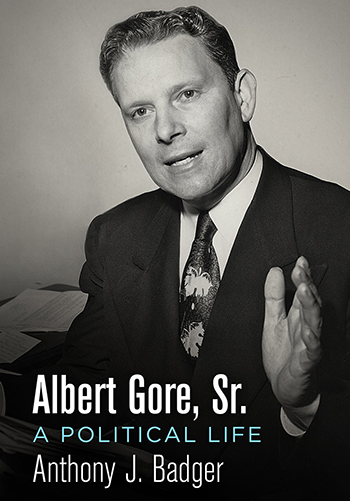In today's political landscape, the South is seen as a bastion of conservatives, but that hasn't always been the case.
One of the most progressive politicians the South has ever produced was MTSU alumnus Albert Gore Sr., Oxford scholar Dr. Anthony Badger said during a forum held Monday, Sept. 16 at MTSU about his book, "Albert Gore Sr.: A Political Life."
"Gore built his career on a platform to the left of those south of him and most of them to the north," Badger said. Also participating in the forum were former Vice President Al Gore Jr., political mastermind Kent Syler, and Dr. Mary Evins.
Badger's book is a comprehensive examination of the elder Gore, who served in the U.S. House of Representatives from 1939 to 1953 and in the U.S. Senate from 1953 to 1971, and his impact on local, state and national politics. Gore Sr. died in 1998 at the age of 90.
A professor of American history at Northumbria University at Newcastle upon Tyne in the United Kingdom, Badger is a specialist in post-World War II Southern U.S. history. He began performing research for his book at MTSU's Albert Gore Research Center, which houses the elder Gore's papers, in 2001.

Being that Albert Gore Sr. has been out of office since the 1970s, his legacy may have faded from the public consciousness, but his impact hasn't. Here are a few things you should know about Albert Gore Sr.
1. He was the architect of the "New South"
Badger called Albert Gore Sr. a "leading liberal and played a key role in transforming the South." The issues championed by Albert Gore led to the growth of the Sunbelt in the late 20th and early 21st centuries.
Observing that Gore Sr.'s career "spanned the creation of the modern South," Badger said that the Carthage, Tennessee, native represented a "new generation of Southerners" that President Franklin D. Roosevelt hoped would embrace his New Deal economic plan to pull the country out of the Great Depression.
Gore Sr.'s support was paramount in bringing electric power to the rural South through the Tennessee Valley Authority, providing atomic power for the national defense through the Oak Ridge National Laboratory and constructing a network of interstate highways through the Federal Highway Act of 1956.
2. He championed the interstate system
A new generation of southerners like Albert Gore and Lyndon Johnson believed that the federal government could transform the poorest region of the country. And Albert Gore sought solutions to solve the problems of society through government.
"That faith in the federal government to solve problems has all but disappeared," Badger said.
Gore, Johnson and others looked to massive infrastructure investments like the Tennessee Valley Authority and saw the impact it had.
That's why Albert Gore pushed for the development of the Dwight D. Eisenhower Interstate System.
Albert Gore saw the interstate system as a way to transform the nation and Tennessee's economic prospects.
Because Albert Gore actually helped draw the map for the interstate system, he made sure his home state was well covered. He made Nashville the center of gravity for the country and laid foundation for growth in the 1980s and now, Badger said.
Ever wondered why Nashville has three interstates (24, 40 and 65)?
Albert Gore Sr. is why.
"He drew the map and made Middle Tennessee the center for that," Al Gore Jr. said.
Al Gore Jr. recalled driving with family from Carthage to Nashville. His dad would point to the other cars "continuous stream of them" everybody bought cars after WWII. "These little two lane roads aren't enough for them anymore," the senior Gore said to his son.
Gore said that story was what inspired his support of the development of the Internet. He said he knew that the Information Age was coming and the government should support the development of the Internet.
"That's where that meme can from," Gore said to laughs in the crowd, presumably about him inventing the Internet.
3. He worked to find an alternative to racism
Albert Gore Sr. was concerned with lifting fortunes of low-income citizens of both races, but he was committed to racial justice.
Gore Sr. was one of only three Southern U.S. Senators to refuse to sign the Southern Manifesto, a 1956 document stating opposition to racial integration. Al Gore Jr. recalled how much his father hated racism, not only because of its inhumanity, but because it was the basis of a tactic to keep economic elites in positions of power.
"He said African Americans died in WWII and I believe they deserve the right to vote," Badger said.
Al Gore agreed saying his father believed the growth of the South had been "stunted" by pitting poor Blacks and whites against each other to suppress wages and consolidate power in the hands of a few families.
"One of his core beliefs was that the history of the South had been stunted by the deliberate strategy to divide the low- and middle-income working white families from low- and middle-income black families," Al Gore said. "That divide, enforced by racism and, of course, at times, terror was a key political strategy in keeping political control in the hands of what he always referred to as the special interests."
4. He was an early environmentalist
Al Gore Jr. said his father's generation was dedicated to fighting soil erosion (see dust bowl). His father could spot gullies in their early stages and would dam them up on their family land. His mother read them Rachel Carson's seminal environmental book "Silent Spring."
"For me it was a hop skip and a jump from gullies and Carson to the environmental issues we face today," Gore said.
So it isn't surprising that his son would champion the fight against Climate Change.
Al Gore was awarded the Nobel Peace Prize in 2007, along with the Intergovernmental Panel on Climate Change. During the forum, he connected the worldwide climate crisis to Hurricane Dorian, at one point a Category 5 storm that devastated portions of MTSU President Sidney A. McPhee's native country, the Bahamas and killed McPhee's 24-year-old grandniece.
Al Gore Jr. also addressed the impact of Climate Change, which can be seen in the video below.












